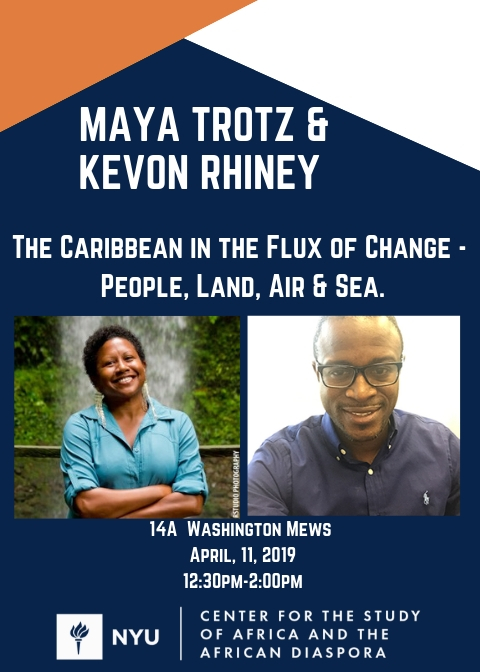
- This event has passed.
African Diaspora Forum-Maya Trotz (U. of South Florida) and Kevin Rhiney (Rutgers U.)
April 11, 2019

Caribbean in the Flux of Change – People, Land, Air & Sea
Battered States and ‘Resilient’ Futures? A Critical Reflection on the Caribbean post Irma-Maria
Kevon Rhiney, Rutgers University
Roughly one month after hurricanes Irma and Maria battered the Caribbean nation of Dominica, Roosevelt Skerrit, the Dominican Prime Minister asserted, “we have a unique opportunity to be an example to the world, an example of how an entire nation rebounds from disaster and how an entire nation can be climate resilient for the future.” Skerrit’s message relays a common theme emerging throughout the Caribbean after the devastating 2017 hurricane season, that saw two of the most powerful hurricanes in recorded history wreaking havoc across the region. Though Irma and Maria serve as a stark reminder of how vulnerable the Caribbean is to extreme climate events, there seem to be a growing emphasis on the opportunities presented by the post-hurricane situation. Ideas around resilience and ‘building back better’ are increasingly being used to justify recovery efforts aimed at rethinking existing development paradigms. At the same time, events that have unfolded since Irma and Maria have revealed just how much these ‘natural’ disasters intertwine with underlying issues of non/sovereignty and uneven development. In this talk, I demonstrate how the current post-hurricane situation has become a highly contested and politicized post/colonial terrain, and offer some initial thoughts on how we might best understand these recent developments. This includes a foregrounding of the historical legacies driving modern-day vulnerabilities across the region, and a rethinking of ‘resilience’ as a precondition for securing sustainable Caribbean futures under a changing climate.
Caribbean People Centered Resilient Futures
Maya Trotz, University of South Florida
Resilience, Build Back Better, Climate Adaptation – commonly used terms in the Caribbean region today for new climate financing mechanisms like the Green Climate Fund (GCF). Having a job that puts food on the table gets packaged as investments in workforce development with a particular emphasis on gender, improved irrigation for agriculture, value add nutritional crops, and improved livelihoods. Restoring a coral reef devastated by an earthquake and/or hurricane becomes a coastal resilience project to increase biodiversity, flood protection, science literacy on climate change, the number of women licensed as tour guides, and improve livelihoods. As the region plans to raise the funds and spend billions of dollars on infrastructure for the provision of food, water, electricity, transportation etc., designing the projects for that investment provides opportunities for meaningful community engagement, including inter island and diaspora relations. Using projects that I have worked on in the Caribbean, this talk discusses opportunities and challenges to build more community focused solutions and management practices for critical resources. These projects range from 1) Water Sector Resilience for Sustainability in Barbados, a GCF funded project to the Caribbean Community Climate Change Center for the Barbados Water Authority, 2) Reefs of Hope, a $100 million dollar 100&Change proposal, and 3) a sustainability challenge for high school students in 12 Caribbean countries, the Sagicor Visionaries Challenge.
